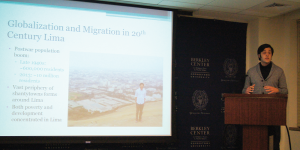
Nicholas Dirago (COL ’14) speaks to an audience at the Berkley Center for Religion, Peace and World Affairs about his recent trip to Lima, Peru, and his efforts to help the city’s education system.
Four student participants in the Education and Social Justice Project presented research on their efforts to promote social justice through education from their respective summer experiences all over the globe Tuesday at the Berkley Center for Religion, Peace and World Affairs.
Currently in its fourth year, the ESJ Project, a creation of the Berkley Center and the Center for Social Justice, awarded research fellowships to Nick Dirago (COL ’14), Annie Dale (COL ’14), Sarah Baran (COL ’14) and Elisabeth Lembo (COL ’14).
“Often [other] programs are about arriving to developing countries as a student from the first world with something to teach or impart or bestow, which generally reproduces the same power dynamics that have marginalized so many communities in the first place,” Dirago said. “[ESJ] allows us to listen to the voices of communities that often go unheard.”
The project aims to help students build knowledge about the connections between the global challenges of poverty and education, by enabling students to travel abroad for three weeks to examine innovative Jesuit education initiatives. The ESJ Project is made possible through the support of Rodney Jacob (GSB ’86, LAW ’89) and other members of the Georgetown community. The research fellowships include travel, lodging, meals and a $1500 stipend.
Dirago, who visited Lima, Peru, was struck by the socioeconomic disparity and the challenge it poses to educators in Peru. By examining the broader mission of Jesuit education in the country through the lens of globalization and inequality in Lima, Dirago was impressed to discover Jesuit efforts to support all students, regardless of socioeconomic status. He presented his research on the ethos and pedagogy of the College of the Immaculate Conception, the Jesuits’ prestigious flagship institution, and of Fe y Alegria, an institution serving underprivileged students in Peru.
Dale discussed her examination of the efforts of the Apostolic Prefecture in Battambang, Cambodia, to reduce school dropout rates through innovative family support mechanisms.
Determining the factors behind the high dropout rates between primary and secondary school for young Cambodians, Dale’s interviews concluded that lack of parental support, financial and physical inaccessibility and forced child labor are the biggest factors.
“I feel like the best way to truly understand other people is to recognize their challenges and work together towards finding solutions,” Dale said. “This was my motivation in Cambodia. I really wanted to understand the Cambodians I was working with as well as the other international volunteers, and the best way to do that was to join their fight for educational equality.”
Baran travelled to Buenos Aires, Argentina, to research Protagonizar, a small microfinance institute founded by Jesuits. She conducted interviews with its entrepreneurs and workers, focusing on how the institute infuses values of financial accountability into the community and promotes the economic and personal development of the entrepreneurs.
“It was very overwhelming and inspiring to see the impact of this microfinance model on individual lives,” Baran said.
Lembo shared her research from her work at the Jesuit University of Krakow, Poland, where she explored the revival of Jesuit education with a particular interest in the lack of understanding of social justice in Poland, despite the country’s Roman Catholic majority.
As a future corps member for Teach for America, Lembo was drawn to the ESJ Project as an opportunity to compare international education initiatives with the more familiar domestic initiatives.
“It was really neat hearing [Jesuit] enthusiasm about the innovative work that is being done by Jesuits across Poland,” Lembo said.
Though each student had a reportedly positive experience, the fellows’ research was not without challenges. Most found it difficult navigating a new country completely on their own. Dale, for example, knew no Khmer, the spoken language in Cambodia, before arriving in the country.
“[I] had no one to guide me, and was responsible for organizing and executing 15 interviews with educators, many of whom did not speak any English,” Dale said. “This was not like a study abroad program through which everything was planned for me. I had to arrive in Cambodia, hit the ground running and get a job done independently in three weeks.”














